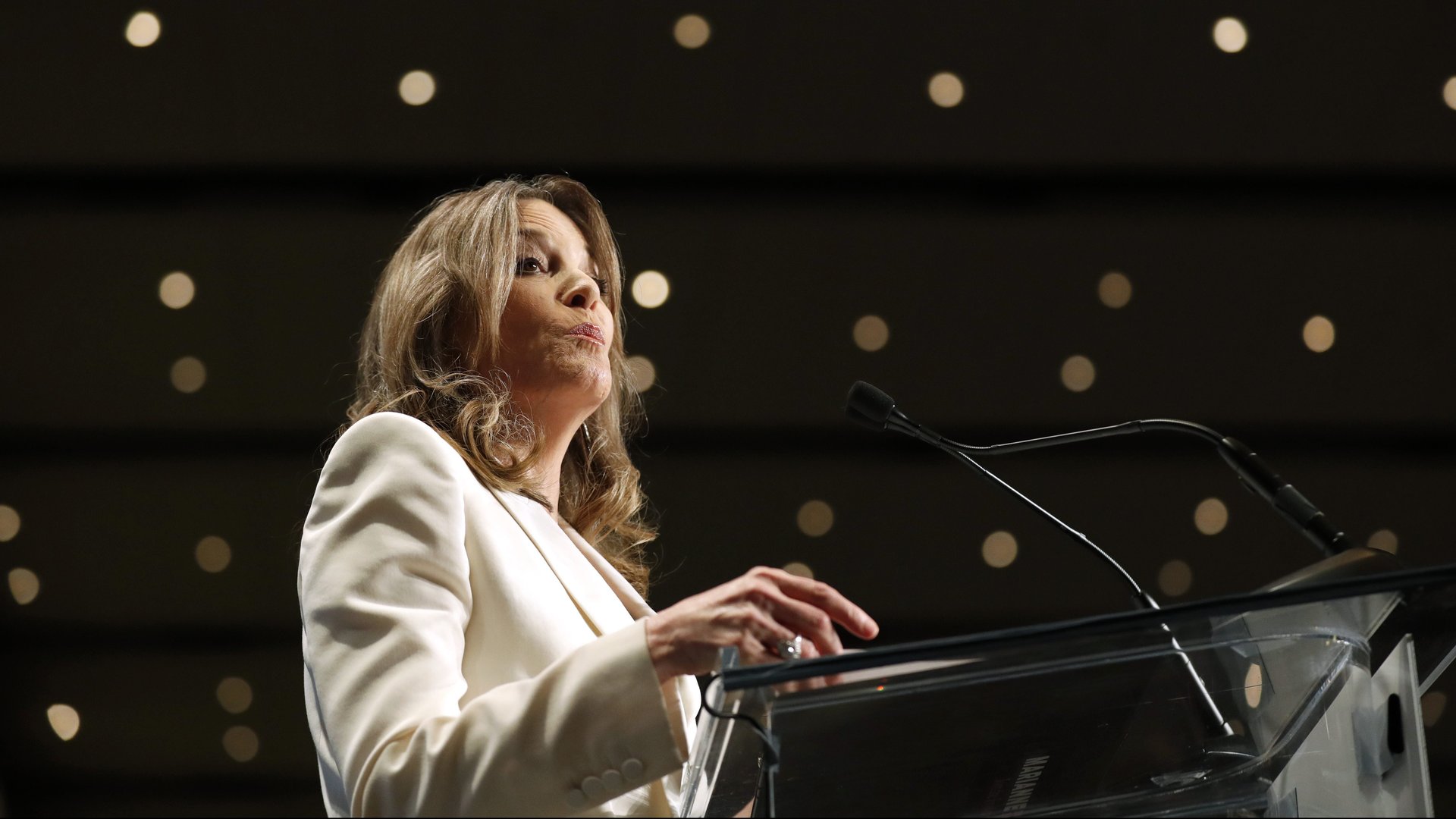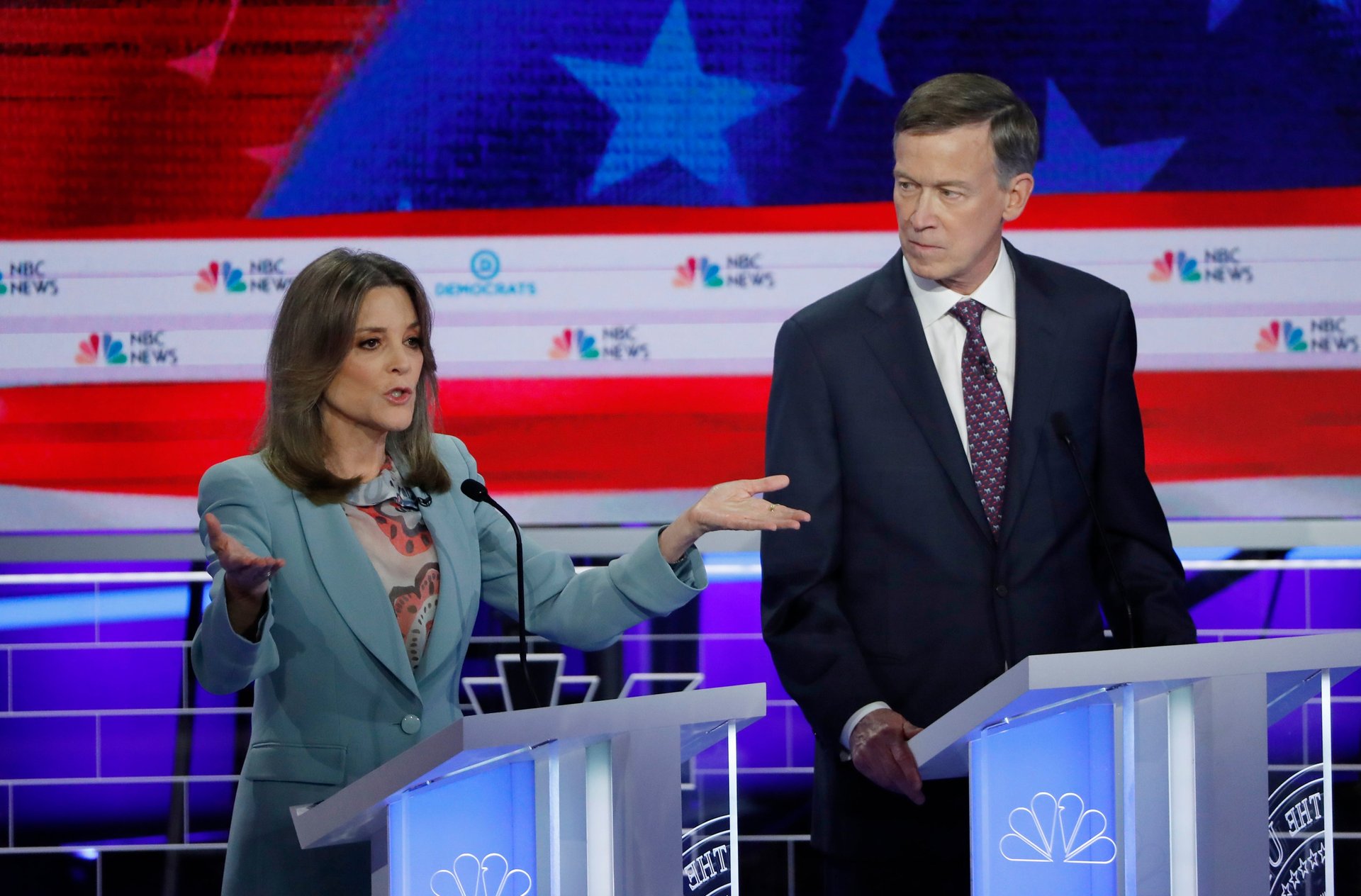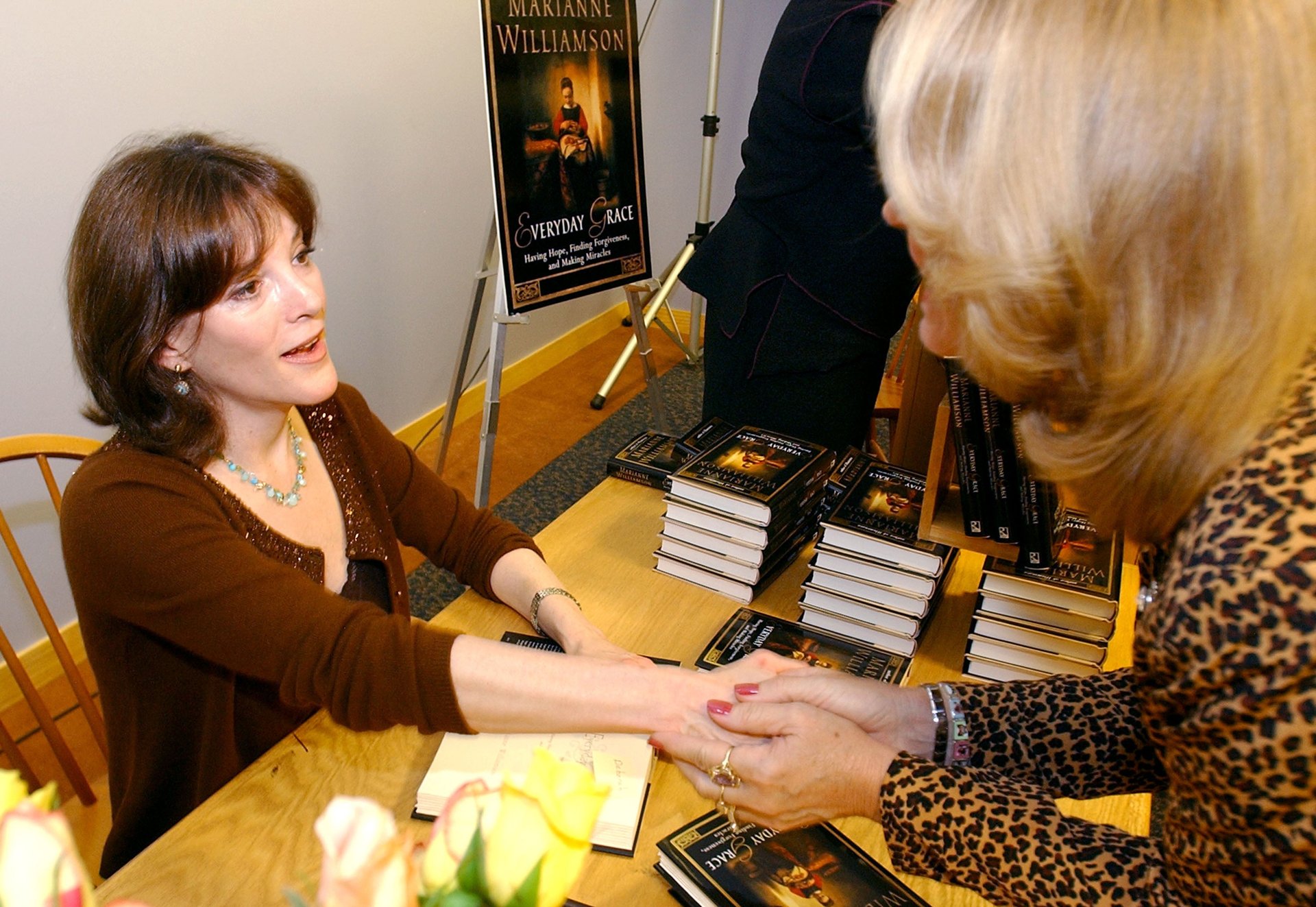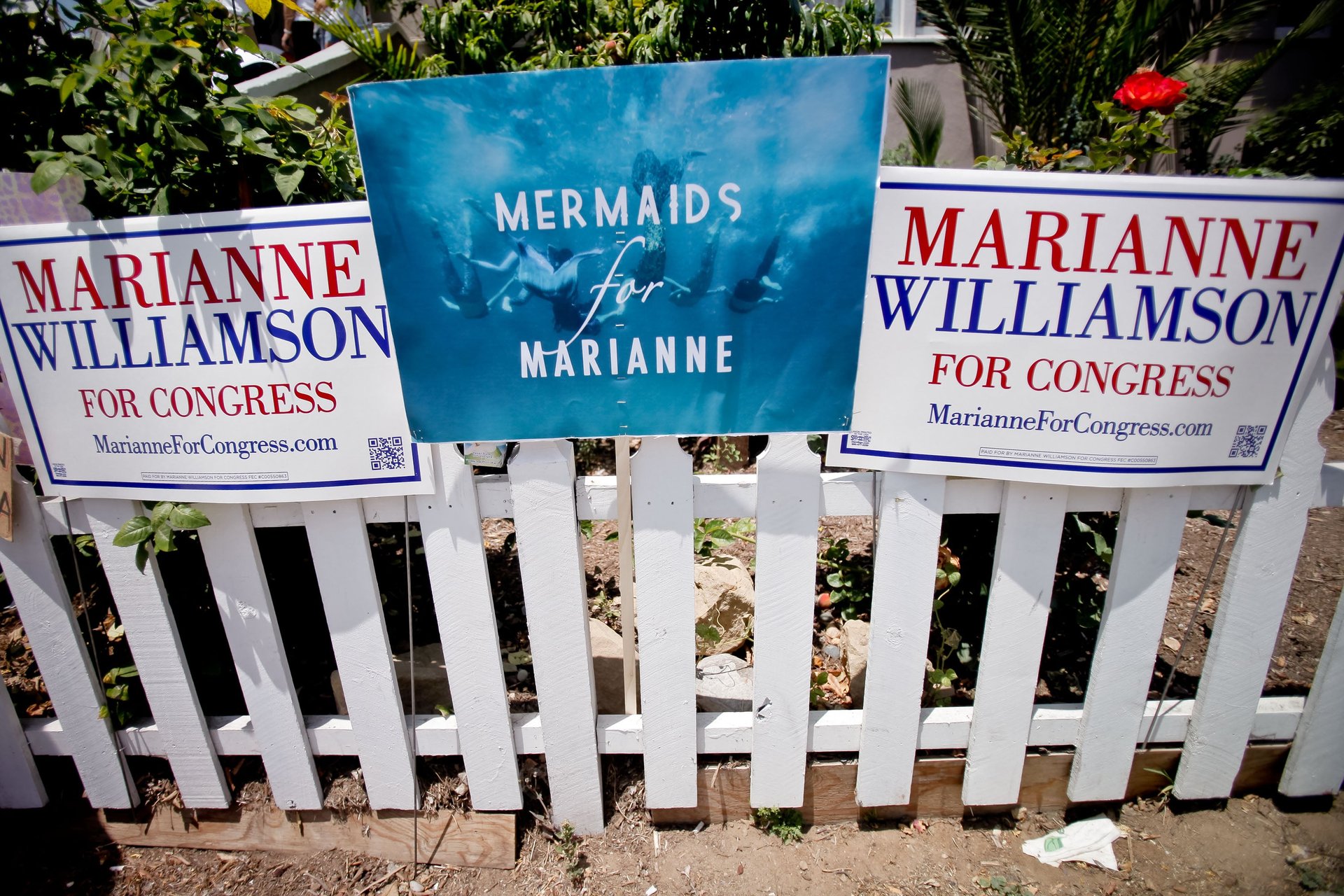Marianne Williamson is campaigning with the language of self-help and spirituality
“Ladies and gentlemen, it’s the 11th hour. It’s not midnight yet, but we need to wake up, and we need to wake up fast.”


“Ladies and gentlemen, it’s the 11th hour. It’s not midnight yet, but we need to wake up, and we need to wake up fast.”
It’s a hot July evening, and Marianne Williamson is talking to hundreds of rapt followers and fans at Los Angeles’ Saban Theatre. “We have to atone for how irresponsible we’ve been,” she says. “And as we do that, it’s amazing what will happen inside of each and every one of us.”
Williamson’s address is no religious sermon, self-help seminar, or 12-step meeting, though it contains elements of all of the above. It’s a campaign speech. Back in January, she had appeared on the same stage to announce her run for the US presidency. Since then, the bestselling author, activist, and spiritual leader has been calling on her followers to get engaged with America the way they do any perceptual shift or personal transformation—what they might refer to as “miracles.” Williamson has written a veritable library on miracles, beginning with 1992’s A Return to Love, the success of which propelled her to fame via The Oprah Winfrey Show. She defines a “miracle” as a shift in thinking, and says that the ur-miracle is the shift from fear to love, which is not incidentally also the cornerstone of her campaign.
It wasn’t until June 27, at the first Democratic debate, that Williamson truly blew onto the national political stage, like a strong coastal breeze. With the bearing of a 1940s movie star, she coolly told 15 million viewers that she intended to “harness the power of love” to go toe-to-toe with Donald Trump, and to call up the prime minister of New Zealand to tell her, “Girlfriend, you are so on,” when it comes to creating the best nation in the world for children. The jokes came fast and furious: Punchlines lobbed in Williamson’s direction included “Secretary of Crystals,” “your mom after too much Xanax on an airplane,” and “doing an incredible job for someone who is obviously digesting an edible on television.” She has since acknowledged that she understands how “my delivery made me vulnerable to mockery.”

But Williamson isn’t joking. And while she is beyond a long shot—as of July 26, she was polling nationally at less than 1%—there is real potential in activating voters who have not historically been politically involved, in part because they didn’t see themselves or their values reflected in politicians. Williamson refers to these spiritual seekers and rigorous self-improvers, her followers and fans, as the “higher-consciousness community.”
For now at least, they’re also her base.
“Whatever seemed outrageous, I wanted to do”
Marianne Williamson, 67, grew up in a liberal, middle-class Jewish household in Houston, Texas. She describes her father, an immigration lawyer, as a tough but compassionate parent who took his children to Vietnam in 1965 so they would witness the consequences of war.
Williamson spent two years at Pomona College, and on the campaign trail recalls her time there as an early example of merging contemplative spirituality with political activism. “We read Ram Dass and Alan Watts in the morning,” she told the audience in LA. “And went to Vietnam anti-war protests in the afternoon.” After moving to New York, Williamson continued what she describes as a spiritual search. “Whatever seemed outrageous, I wanted to do,” she writes of her early 20s in the introduction to A Return to Love. “And usually, I did.”
In 1977, Williamson first encountered A Course in Miracles, a three-volume “self-study spiritual thought system” that was published a year earlier, after its author channeled a voice she identified as Jesus. Williamson was deeply moved by the books, which she, like many followers, refers to as “the Course.” “This was my personal teacher, my path out of hell,” she would later write.
Williamson was guiding small groups in LA based on the Course’s teachings when the AIDS crisis hit in the 1980s. In the introduction to her newest book, A Politics of Love, she calls the period a “collective trauma,” and says she witnessed how “love not only makes a crisis endurable; it makes it transformable.”
If the Course was the first book to change Williamson’s life, the next was her own, based on it. In 1992 she published A Return to Love: Reflections on the Principles of A Course in Miracles. The book, a sort of CliffsNotes of the Course’s teachings, endowed Williamson with fame and bestseller status—thanks in no small part to Oprah, who calls Williamson “a spiritual friend and counselor” and has featured the author multiple times on her shows. Since then, Williamson has written more than a dozen books applying the Course’s principles to topics including money, weight loss, and feminism.
In 1998, Williamson moved to Michigan, where she became the spiritual leader of what was then called The Church of Today—a nondenominational congregation that was struggling until Williamson took the reins. A 2001 Detroit Metro Times cover story describes how Williamson transformed the largely white, financially strapped “self-help church” into the second-largest Unity church in the US. Williamson stayed on until 2002 and in the Detroit area through 2006.
At the Saban Theatre, two of Williamson’s former Detroit congregants, Glenda Gill and Joycelyn Thompson—both black women in their 60s—described Williamson’s transformation of the languishing church into a vibrant house of worship, complete with a gospel choir. “I think she’s the person because the mess that we’re in, we need a healing,” Thompson said. “She’s smart enough to be president.”

Williamson still describes herself as a “faith leader” today, but this isn’t her first go at politics. In 2014, she ran an ultimately unsuccessful Congressional campaign as an independent in LA’s tony 33rd district. She came in fourth place, garnering support along the way from Katy Perry, Alanis Morissette, and more than one Kardashian.
“When I started my career 20 years ago, my conversation seemed fringe,” Williamson said at the time. “Today that fringe is baked into the cake. You are fringe if you don’t know what it is. You’re the one who looks silly today if you don’t have some understanding of some integrated holistic perspective on life.”
And that was five years ago.

“The magic is here! I want to stay.”
Today, the “fringe” is increasingly mainstream. Crystals may be punchlines, but they’re also symbolic of the $4.2 trillion wellness boom that traffics in promises of better sleep, skin, and self-actualization. Let’s not forget that Oprah was briefly considered a presidential hopeful after her 2018 Golden Globes speech on gender and racial inequality, or that Gwyneth Paltrow’s Goop is a $250 million business. Williamson is also a hero to the recovery community, appearing frequently on the blogs of 12 Steppers. Aerosmith frontman Steven Tyler credits her for helping him achieve sobriety, and in 2001 sang at Williamson’s church in Detroit.
But what the higher-consciousness community has built in financial and cultural clout, it may still be realizing in the political sphere.
“I’m quite ashamed to say that I’ve really never engaged in politics,” Susy Markoe Schieffelin told me last week. A 30-year-old Santa Monica-based sound healer, Schieffelin credits Williamson’s book, The Divine Law of Compensation, with her six-figure business, which offers Kundalini yoga instruction, Reiki healing, and sobriety coaching. “As soon as I saw that Marianne was running, I was like: ‘I really believe in her and I really want to do whatever it takes to create change in our country from a real place, that’s from healing'” she said. “That inspired me.”
Schieffelin attended a $250 fundraiser for Williamson in Beverly Hills after she saw that Ben Decker—a fellow meditation teacher who also hosts ayahuasca ceremonies—was on the host committee. She’s also considering volunteering her social media expertise to the campaign.
At the LA event, I sat next to Bryan Marn, a 46-year-old events planner, who told me Williamson’s work helped him deal with deep sadness following his divorce. He said her announcement in January was the first time he had been involved or interested in politics since he registered to vote at age 18, and the $25 suggested admission that night represented his first political donation.
“I’m not even registered to vote [in California] right now,” Marn said. “But I am planning to register and vote in the next election, and largely because of Marianne.”
After Williamson’s speech, Debbie Kinsinger, a 62-year-old environmental consultant in a white crochet top and a silver heart pendant, lingered in the lobby, delaying a long drive back to San Diego. “The magic is here!” she said, as her candidate took selfies with fans. “I want to stay.” Kinsinger said she had never been to a political rally before, but she saw Williamson speak at a yoga festival a few years ago and has read several of her books.
“She so influenced my life in so many powerful and fundamental ways,” Kinsinger said. “I was hoping that we would get Marianne Williamson, the one I know. And we did. It was very familiar to me from the way that she has been before.”
“Someone has harnessed fear”
Williamson’s fans need not worry about recognizing her: Even in politician mode, she is speaking the language that endeared her to them—that of spirituality, self-help, and individual transformation. Those tenets also form the backbone of her presidential campaign.
In A Return to Love, Williamson wrote that “the shift from fear to love is a miracle.” Today, she says, that is precisely the shift required to defeat Trump. “Someone has harnessed fear,” Williamson said at the Saban Theater. “We must now harness love. I am running for president because I believe nothing less than that will turn the ship around.”
She frames the current moment in US history as a moral crisis offering the opportunity for miraculous change, and gives condensed, long-arc-of-history lessons reminding crowds that the people who fought for civil rights, women’s suffrage, and the end of the war in Vietnam were also trying to correct America’s moral and ethical path. Williamson likens a national turnaround to an individual’s recovery process, asking her followers to “take a fearless moral inventory” and telling them, “We don’t have time for you to get through your trauma work before you show up for your country.”
Jordan Brodie, a 27-year old singer-songwriter and LGBTQ activist who lives in Orange County, attended the LA event and has followed Williamson’s work for a decade. “I think having a spiritual leader as a politician is genius right now,” he said. “There’s a lot of brokenness and trauma and angst and anxiety.” Brodie said he has been sober for two and a half years and was encouraged by his sponsor to engage in civic life. He recently signed up to volunteer for Williamson’s campaign.
Based on what Williamson has shared of her political platform, her approach as president would include the formation of a US Department of Peace, access to preschool for all US children, the elimination of the sale of assault rifles, racial reparations to the tune of $200-$500 billion, and the establishment of a universal basic income. But while Williamson touches on these issues on the campaign trail, she doesn’t get mired in them. Instead, she positions herself as something of an anti-Trump—an outsider who, like him, eschews the conventional approach to politics in favor of a deeper emotional appeal—and in doing so, has absolved herself of combating him the way a conventional politician would.
“If you think we’re going to beat Donald Trump by just having all these plans, you’ve got another thing coming,” Williamson said to her fellow contenders on the debate stage in June. “Because he didn’t win by saying he had a plan. He won by simply saying ‘make America great again.'”
“I am not a woo-woo silly person”
To stand even a chance of a chance at the presidency, Williamson’s message will have to resonate far beyond her fans. So far, that’s been a tough sell. Since the debates, digging up her loopiest tweets has become an internet blood sport, and “Girlfriend, you are so on” is already immortalized as a meme applicable to nearly any situation.
Williamson is also up against the perception that she’s anti-science. At a New Hampshire campaign appearance, she referred to vaccination mandates as “Orwellian” and “Draconian,” only to quickly backpedal on Twitter and in a heated exchange with Meghan McCain on The View. Williamson said she “misspoke,” and is not anti-vaccine but is skeptical of Big Pharma.
Much of what Williamson has written about sickness and healing sounds wacky. In A Return to Love, she suggests that sick people approach their illness with love instead of hate, visualizing their AIDS or cancer as a Darth Vader suit that unzips to reveal an angel. But in the same chapter, Williamson writes of receiving a “miracle” in the form of antibiotics for her own sore throat, because “the Holy Spirit finds ways to express His power through vehicles we can accept.” (Her vehicle was Erithromycin.)
Williamson grappled with similar skepticism during her 2014 congressional run. When interviewed by the New York Times Magazine, she noted that she had never called herself “a spiritual guru,” and said “I am not a woo-woo silly person.” More recently, she reiterated the point in an interview with Madeline Brand, host of the popular Los Angeles public radio show Press Play.
“Whether it was Gandhi or it was Martin Luther King, Jr., the idea of saying that there is a force of love inside all of us that propels us into our political action, as well as every other aspect of our lives, this is not new. It’s not woo-woo. It’s not wacky. It’s part of great political and philosophical traditions for centuries.”
Perhaps even more resonant today is the idea that someone very unexpected can become president. Indeed, interviewers like Brand, Anderson Cooper, and Stephen Colbert have all regarded Williamson and her candidacy more seriously than her place in the polls might suggest. Perhaps they’d be crazy not to, considering the outcome of the 2016 election. After all, Williamson is a practiced performer with a powerful personal brand. She looks preternaturally comfortable onstage, where she speaks without notes and periodically leans into the microphone to drop her intonation for Johnny Cash-style emphasis.
“There’s only one thing that can defeat a phenomenon,” Williamson has grown fond of saying about Trump. “Another phenomenon.”